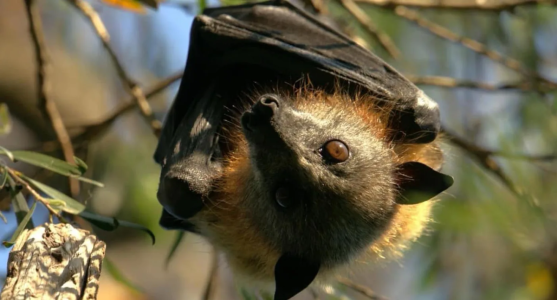'Be careful driving with your windows down, bats are around': this warning just got real
By
Maan
- Replies 2
There are moments on the road that can catch us completely off guard, leaving us with more than just a story to tell.
It’s the kind of unexpected encounter that makes you rethink the simplest habits.
This one might just make you do a double-take. Keep reading to find out why you should be more cautious next time you hit the road.
A Queensland driver discovered the hard way why leaving windows down while driving might not be the best idea after an unexpected encounter with wildlife.
While cruising along the Gold Coast, the motorist recounted an incident in which a fruit bat flew into their car through an open window, bit their finger, and then swiftly exited.
This strange episode has led wildlife experts to urge drivers to be cautious, especially around areas with nectar-bearing trees.
‘Be careful driving with your windows down, bats are around,’ the driver posted online, sharing their shock and adding, ‘the bat bit my finger on the way out.’
They also advised, ‘They seem to be flying low, so keep ya windows up at night and be safe.’
Rhiannon Traish-Walker, President of Bats QLD, confirmed that their rescue centre frequently received reports of car strikes, particularly in Robina, where this incident happened.
‘There are a lot of flowering trees along the roadside and when bats get spooked they have a tendency to fly out and hit cars.
Unfortunately, in this instance, the bat has gone into the car. It’s pretty unlucky for the person,’ she told Yahoo News Australia.
Flying foxes, which rest upside down and form a U-shape when taking flight, are prone to collisions with vehicles. This unique flight pattern makes them vulnerable to unexpected runs-in.
The sudden intrusion of a bat into the vehicle likely caused chaos for the driver, who was bitten in an instinctive response as the creature reacted in the ‘only way it knew how.’
Though less than 1% of bats in Australia carry the potentially deadly lyssavirus, anyone bitten should seek medical care without delay.
NSW Health notes that there is no effective treatment for rabies or Australian bat lyssavirus (ABLV) once symptoms appear, which can escalate rapidly to paralysis, delirium, and death within a couple of weeks.
Traish-Walker praised the driver for going straight to the hospital and getting vaccinated. ‘There is a small but real chance that they can have lyssavirus,’ she said.
She emphasised that the disease remains ‘silent until you develop symptoms,’ at which point it becomes ‘too late.’ ‘It’s a simple case of if you’re bitten, go to hospital to get those vaccinations. We have a simple rule of no touch, no risk,’ she added.
Traish-Walker highlighted that this time of year sees bats taking extra risks to provide for their young. ‘There will be more mouths to feed at this time of year and a bit more risk-taking to get to food sources,’ she explained. ‘They’ll start going lower for food that they normally wouldn't dare to.’
She advised that if anyone comes across a bat on the ground, they should contact Bats QLD or their local bat rescue, stressing that cars pose a significant danger to the animals.
Councils plant flowering trees right next to the roads and bats go for them, and unfortunately because of the way they fly, they have to do a U-shape to get that upward trajectory so they are more likely to be hit by cars,’ she added.
Despite their accidents, Traish-Walker described bats as ‘nice and friendly’ creatures.
The decline in flying fox populations is worrying, with climate change and habitat destruction due to development major contributing factors to their endangerment.
Without these animals, the health of Australia’s old-growth forests could suffer.
Flying foxes are essential for pollinating native plants, travelling up to 50 km to feed and spreading genetic diversity among flowering trees—an ability most birds do not have.
This incident serves as a stark reminder for Aussies to be cautious and mindful when driving, particularly in areas where wildlife is active.
Keeping windows up, especially at night, can help prevent unexpected and potentially dangerous encounters.

What steps do you take to stay safe while driving at night? Share your thoughts in the comments.
It’s the kind of unexpected encounter that makes you rethink the simplest habits.
This one might just make you do a double-take. Keep reading to find out why you should be more cautious next time you hit the road.
A Queensland driver discovered the hard way why leaving windows down while driving might not be the best idea after an unexpected encounter with wildlife.
While cruising along the Gold Coast, the motorist recounted an incident in which a fruit bat flew into their car through an open window, bit their finger, and then swiftly exited.
This strange episode has led wildlife experts to urge drivers to be cautious, especially around areas with nectar-bearing trees.
‘Be careful driving with your windows down, bats are around,’ the driver posted online, sharing their shock and adding, ‘the bat bit my finger on the way out.’
They also advised, ‘They seem to be flying low, so keep ya windows up at night and be safe.’
Rhiannon Traish-Walker, President of Bats QLD, confirmed that their rescue centre frequently received reports of car strikes, particularly in Robina, where this incident happened.
‘There are a lot of flowering trees along the roadside and when bats get spooked they have a tendency to fly out and hit cars.
Unfortunately, in this instance, the bat has gone into the car. It’s pretty unlucky for the person,’ she told Yahoo News Australia.
Flying foxes, which rest upside down and form a U-shape when taking flight, are prone to collisions with vehicles. This unique flight pattern makes them vulnerable to unexpected runs-in.
The sudden intrusion of a bat into the vehicle likely caused chaos for the driver, who was bitten in an instinctive response as the creature reacted in the ‘only way it knew how.’
Though less than 1% of bats in Australia carry the potentially deadly lyssavirus, anyone bitten should seek medical care without delay.
NSW Health notes that there is no effective treatment for rabies or Australian bat lyssavirus (ABLV) once symptoms appear, which can escalate rapidly to paralysis, delirium, and death within a couple of weeks.
Traish-Walker praised the driver for going straight to the hospital and getting vaccinated. ‘There is a small but real chance that they can have lyssavirus,’ she said.
She emphasised that the disease remains ‘silent until you develop symptoms,’ at which point it becomes ‘too late.’ ‘It’s a simple case of if you’re bitten, go to hospital to get those vaccinations. We have a simple rule of no touch, no risk,’ she added.
Traish-Walker highlighted that this time of year sees bats taking extra risks to provide for their young. ‘There will be more mouths to feed at this time of year and a bit more risk-taking to get to food sources,’ she explained. ‘They’ll start going lower for food that they normally wouldn't dare to.’
She advised that if anyone comes across a bat on the ground, they should contact Bats QLD or their local bat rescue, stressing that cars pose a significant danger to the animals.
Councils plant flowering trees right next to the roads and bats go for them, and unfortunately because of the way they fly, they have to do a U-shape to get that upward trajectory so they are more likely to be hit by cars,’ she added.
Despite their accidents, Traish-Walker described bats as ‘nice and friendly’ creatures.
The decline in flying fox populations is worrying, with climate change and habitat destruction due to development major contributing factors to their endangerment.
Without these animals, the health of Australia’s old-growth forests could suffer.
Flying foxes are essential for pollinating native plants, travelling up to 50 km to feed and spreading genetic diversity among flowering trees—an ability most birds do not have.
This incident serves as a stark reminder for Aussies to be cautious and mindful when driving, particularly in areas where wildlife is active.
Keeping windows up, especially at night, can help prevent unexpected and potentially dangerous encounters.
Key Takeaways
- A Queensland driver had a surprising encounter when an unexpected wildlife incident occurred while driving with their windows down.
- Wildlife experts warn that driving near flowering trees can increase the chances of such incidents, urging caution and keeping windows closed.
- While the risk of disease from such encounters is low, experts emphasise the importance of immediate medical attention if bitten.
- Bats, vital to Australia's ecosystem, face growing threats due to habitat loss, making their interactions with humans more frequent.
What steps do you take to stay safe while driving at night? Share your thoughts in the comments.








